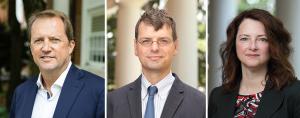
Three faculty members from the University of Virginia’s School of Engineering and Applied Science have been named to the 2025 class of the American Institute for Medical and Biological Engineering College of Fellows. Scott T. Acton, Gustavo Kunde Rohde and Shannon Barker join a select group representing the top 2% of medical and biological engineers nationwide.
“This recognition reflects not just individual achievement, but the strength of our community of scholars working across disciplines to improve human health,” said Jennifer L. West, dean of the School of Engineering and Applied Science and Saunders Family Professor of Engineering.
The AIMBE College of Fellows honors individuals who have significantly contributed to the field through research, innovation, teaching and leadership.
Scott T. Acton: Imaging Tools That Push Medical Research Forward
Scott T. Acton, chair of the Department of Electrical and Computer Engineering and the Lawrence R. Quarles Professor, is known for his work in biomedical image processing — especially using artificial intelligence to extract insights from medical data.
At UVA, Acton leads the Virginia Image and Video Analysis group, where he and his team develop tools that help researchers and clinicians analyze imaging data from the brain, heart and other systems. Their work has improved how diseases are tracked at the cellular level and supported breakthroughs in research on Alzheimer’s, cancer and cardiovascular disease.
His innovations have shaped how biomedical engineers interact with complex data, making it easier for scientists to draw meaningful conclusions from images that once required painstaking manual analysis.
Acton is also a STEM Advisor to the University of Virginia Provost.
Gustavo Kunde Rohde: Mathematical Modeling to Understand Biology
Gustavo Kunde Rohde, professor of biomedical engineering and electrical and computer engineering, is widely recognized for creating mathematical tools that deepen our understanding of form and function in biology.
Rohde’s development of transport-based nonlinear transforms — tools that reimagine how images and signals are analyzed — has gained traction across the biomedical imaging community. These methods have enabled discoveries in organ and tissue modeling, and advanced research in pathology by providing automated ways to analyze the progression of diseases like cancer.
His influence extends beyond the lab. Rohde has helped shape the direction of the biomedical image analysis field through leadership roles in major conferences, journal editorial boards and international education initiatives. His efforts have played a key role in turning image-based cytometry into a quantitative science in research and clinical settings.
Shannon Barker: Shaping How Engineers Learn to Solve Human Problems
Shannon Barker, associate professor and associate chair for undergraduate programs in biomedical engineering, has been honored for her work transforming engineering education — bringing a human lens to the technical work engineers do.
Barker designs learning experiences that bring empathy and real-world context into the classroom. Her students have worked on humanitarian design problems, such as rebuilding infrastructure for a refugee camp, and examined how biomedical engineering can help improve care for a range of patient populations. She has also led a department-wide undergraduate curriculum redesign that brought faculty together to rethink how and what students learn.
As former director of graduate education for UVA Engineering, Barker helped implement a more holistic Ph.D. admissions process that is still in use today. She also secured funding for graduate fellowships and professional development, supporting students not just academically, but as future innovators and leaders.
Her work has made classrooms more collaborative, faculty more engaged in student outcomes, and programs more responsive to the broader social context of engineering.
The 2025 AIMBE Fellows will be formally inducted during the organization’s annual meeting in Arlington, Virginia, March 31.